As part of the strategy for Serbia’s development and the country’s chance on the international scene, the number one priority and potential that is often mentioned is a knowledge-based economy, highly skilled people and new technologies
This is meaningful in many ways: a small country could change its course drastically by riding the wave of the 4th industrial revolution and focusing on digital transformation and innovation.
Post-Soviet Baltic republics are a good example of that, with Estonia, a country of 1.3 million people, being praised for being ‘the most advanced digital society in the world’ today, despite emerging as a very poor and underdeveloped state in the 1990s, after almost 50 years of Soviet rule.
Serbia’s IT sector is growing rapidly year on year, and its software services export was worth over a billion euros in 2018. All great results, but there are many challenges as well, and statistics that paint a different picture.
The results of the citizens’ census from 2012 showed that around 14% of the population is not schooled at all, or only completed one or a few years of primary school. This exceeds the total number of people with higher education qualifications (11%). More than 50% of the population were computer-illiterate. And when it comes to IT exports in 2018, only around 15% were product-based, while services accounted for 85%. Another big challenge in the whole story is the brain drain – with many highly-skilled individuals leaving Serbia to build their careers and grow professionally elsewhere.
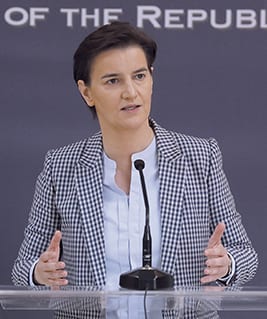 |
ANA BRNABIĆ PRIME MINISTER OF SERBIA |
Real Changes and Real Initiatives
My goal as prime minister is to put strong fundamentals in place so that Serbia that can become even more competitive and can create more sustainable and dynamic growth
We live in the Fourth Industrial Revolution, and the countries that recognise this can change their trajectory in the quickest and most direct way. This is especially true for smaller countries like Serbia, particularly where we might not have fully utilised all the opportunities of previous revolutions, especially the third industrial revolution,” said Serbian PM Ana Brnabić, speaking at the #Conference “Talent MeetUp 1.0”, held in Belgrade on 28th December 2018.
It is high time for Serbians at home and abroad to come together at a conference like this one, in order to discuss how we can all work together to created positive changes in a more structured and sustainable way.
The goal of this government is to transform both our economy and our society, primarily by focusing on the unique attributes of knowledge, innovation, ingenuity, creativity and talent. We are aiming to build a more competitive Serbia with more sustainable and dynamic growth, and in doing so to compete with other countries not on the basis of how cheap we are, but instead on the basis of how much we know and how creative we are. Technological advances also bring in new opportunities for cooperation. We no longer have to be in the same place physically in order to work together. My greatest desire is not only for our people to stay in Serbia but also for many of the people who have left to come back. I recognise that we can’t always achieve this, but the technology still allows us to work together on initiatives and tangible projects as if we were all in Serbia.
I also want to mention some of the things that the Serbian Government has undertaken and in some cases already completed with the goal of transformation. We introduced Scratch and Python computer programming to primary schools, delivered a five-fold increase in specialised IT departments in secondary schools, boosted capacity at technical faculties throughout Serbia by twenty percent, strengthened the Innovation Fund, introduced the Science Fund, secured Serbia’s full membership in CERN, and opened the Centre for Humanities and Social Sciences in Tršić, which is equivalent to what we already have in the Petnica Science Centre… I also hope that this won’t turn out to be just another conference after which people no longer see each other.
Whenever I travel abroad, I make an effort to try to meet with representatives of our diaspora. I had excellent meetings when I was in London with the Serbian City Club, and when I was in New York, with the Serbian Entrepreneurs. It seems to me that all of this is only the first step, and I would like in the future – perhaps in mid-2019 – for us to see each other again, to revisit what we’ve done, and to see what else is still to do.
I thank everyone present for taking the time to attend and for your interest in helping. This simply underlines once again that positive changes are worth celebrating, whether we’re in Serbia or living abroad.
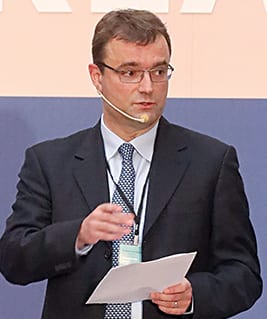 |
MILOŠ STEFANOVIĆ MEMBER OF BOARD OF DIRECTORS OF THE SERBIAN CITY CLUB |
Circular Migration Vs. Brain Drain
During the 1990s, according to some estimates, over 100,000 young people, predominantly highly educated individuals, left Serbia temporarily or permanently. Following the democratic changes, emigration continued with reduced intensity, but that was also the first period after a long time that there was also a return of people to the country. However, the next shock came in 2003, with the assassination of prime minister đinđIć, after which outward migration again intensified, highly educated individuals again began leaving, and those of us who were already in London launched the idea of the Serbian city club, as a network with the basic task of somehow enticing, accepting and connecting all those people
London has always been a hub of talented people, with their own knowledge and ideas, so our club has grown from the original 16 members to encompass over 2,000 members in just a few years, and then we also formed the leadership of the club that is still working today. When we reached such a critical mass, our first initiative was to start getting to know our members specifically: why they left, what they hope for, what their profession is etc., but also whether they’re considering a possible return to Serbia, and what would need to change in order for them to return. Some of our internal research, conducted periodically, shows that there are roughly three groups. One third that is actively working on being able to return to Serbia, by seeking employment or starting some business of their own; one third that mostly comprises people who’ve just arrived and who don’t want to return at all and aren’t considering moving back; and one third that is particularly interesting for the Club as they are considering repatriation but don’t know where to start.
Those of us who run the Club opted for a strategy by which the Club must become a bridge between Britain and Serbia, a link between highly educated, often already professionally profiled people who want to return to the country, and the relevant factors in Serbia that has a shortage of such personnel. We are still working on that job today, but now with membership in over 40 countries on all continents, but also with 500 members who have returned to Serbia.
The largest number of our members who returned to Serbia established their own companies, whether in IT or some other sectors and brought with them knowhow, contacts and investors. People have also returned to the country by finding employment, primarily with foreign employers, but also with domestic firms, though always private. When it comes to the public sector and the gaping holes, members of the Club are very rarely interested in occupying what we like to refer to as a “director’s chair”, and in their opinion they don’t want to build a career that’s dependent on which party membership booklet they carry in their pockets. It’s enough for them that in their career abroad, unfortunately, they are often largely inhibited by the colour of the passport that we all carry from birth.
In the Club, we don’t use the term “brain drain”, first of all, because we think it is inadequate, and that brains are both in and out of Serbia. Our suggestion is to talk much more about “circular migration”, where people and talents are constantly on the move, and the recognition of such a trend of mobility will help us to find mutual solutions, in which the state of Serbia and its economy and society gain an advantage in the long run, along with talented people themselves. When we talk about the future and ways for us to connect, the Club considers social and legal changes as being important, and they are not only important for returnees, but also for those who have already returned.
The best ambassadors for repatriation are our members who’ve returned – ask them where the obstacles that are still stuttering are and enable them to express their creativity to the maximum. There are a handful of examples, from paying taxes in advance to complicated bureaucratic procedures and the obligatory utilising of connections in order to solve problems… The level of income is just part of the story. All of that already hurts talented people who are already in Serbia, who recognise our talents abroad. And all of this hinders the issue of potentially returning.
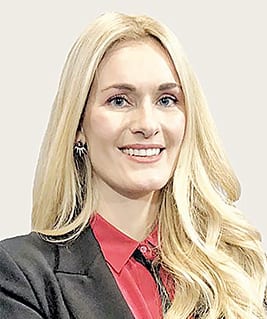 |
ANA RANITOVIĆ FOUNDER AND CEO, CAMPSTER |
Diaspora as a Great Opportunity
What if, instead of thinking of the diaspora as a problem, we thought of it as a solution? People, whether living in Serbia or abroad, are Serbia’s greatest wealth. In this day and age, we don’t have to be physically present to manage, collaborate and share knowledge. Although I live and work abroad, I co-founded an edtech start-up in Belgrade with long-time friends and colleagues. Thanks to new technologies and online communication, it has not once been a problem to work together. In addition, doing business from Serbia has many advantages – start-up and operating costs are very low in comparison to those abroad, and there are many talented and highly qualified young people, especially in IT.
Living abroad has shown me that Serbian expats are very motivated to contribute to their home country, to give something back. Every now and then, we hear that it would be best for members of the Serbian diaspora to return home, but the issue of what they – we –could do and where we could work, once back, is rarely considered. This got me thinking – what if, instead of thinking of the diaspora as a problem, we thought of it as a solution? In this day and age, is it really necessary for people to be physically present in order to manage, collaborate and share knowledge?
People – both those living in Serbia and those abroad – are Serbia’s greatest wealth. The knowledge, expertise and social capital of the diaspora is a great and underutilised opportunity. At the same time, there are many talented and ambitious people who are thirsty for knowledge and innovation, and who would prefer to stay in Serbia if possible. All we need to do is help make the connection, which we did with the ‘Serbia on-line’ [Srbija na vezi] mentorship project. Although small in scale, it yielded impressive results and I can only imagine what could be achieved if such an initiative was conducted at a higher level, systematically. In the end, 120 young scientists were connected with 65 scientists in the diaspora, working in 76 areas, multiple study visits, a couple of international science projects, and cooperation between Serbian and foreign research and science centres.
Although I live and work abroad, that has not been an obstacle to running a business in Serbia. Together with long-time friends and colleagues from Belgrade, I co-founded the edtech start-up, Kampster, 18 months ago with the goal of solving the problem of motivation in online learning. Since then, we have catered to over 20,000 happy users, opened three offices and begun doing business both in Serbia and abroad. And all this with me as a remote partner, which has not once been a problem, thanks to online communication and collaboration technologies and the wonders of low-cost travel. In addition, doing business from Serbia has many advantages – startup and operating costs are very low compared to those abroad, and there are many talented and highly qualified young people, especially in IT.
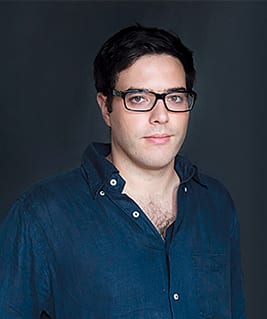 |
VUKAŠIN STOJKOV CO-FOUNDER STARTIT |
Knowledge Economy as Serbian “Trump Card”
In order for us to make any services or products available on the international market, we need to know that information regarding the origin of professionals or products is an important factor that’s taken into account by partners or clients, and that the current brand of Serbia in this context isn’t at an enviable level. In order for us to change this, we need to rely on the diaspora community, where there are many successful and capable people who are willing and able to help
As a country with a poorly developed economy, which doesn’t have a wealth of natural resources on which to base that economy, the only right choice for us is to focus on the so-called knowledge-based economy, to take care as a society that we’ve invested the maximum possible amount in educating our citizens to create products and services based on knowledge and creativity.
These products and services still only make sense if they are offered on the global market, given that our own market is poor and simply small. Considering this, it is of incalculable importance for us brand ourselves as a country, given that information about the origins of a professional or product is a factor that each prospective partner or client considers. In this context, the current Serbian brand isn’t at an enviable level.
In order for us to succeed in this venture, we must try to rely on the diaspora community, in which there are many successful and capable people who can help entrepreneurs and creators from our home country to break into developed markets, and in order for us to succeed in this we must treat the diaspora with full respect and sincerity, and thus build a necessary bridge of trust.
Startit’s role in this is twofold – in the 10 years to date we have focused on building the capacity of the domestic ecosystem, with an emphasis on the development of technological entrepreneurship. We hope that in the next 10 years of our work we will be able to contribute significantly to opening doors for our businesspeople and producers on Western markets, together with organisations and projects like Serbian Entrepreneurs and Serbia Creates.
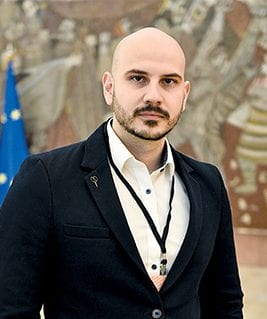 |
NIKOLA MARKOVIĆ
PhD RESEARCHER, RUHR-UNIVERSITÄT BOCHUM |
Many Things Still Impossible in Serbia
I’m in the final stage of defending my doctorate in the field of electrochemistry in Germany. I took my first steps in science at the faculty of chemistry in Belgrade. I defended my master’s work in the field of renewable energy at the INP Institute in Toulouse, France. I noticed that the intercultural environment that’s present in almost all of the scientific teams with which I’ve cooperated is very important for the development of scientists in both a human and a scientific sense
The organisation of master’s and doctoral programmes is at an enviably high level in both France and Germany, where the needs of students are considered to the minutest detail. It’s also common for the city itself to be organised in such a way that it serves students, from public transport to food. The focus of the research I do is in the field of the development of enzymatic biofuel couplings and biosensors, and this is a very specific field that isn’t very well developed in our country. Although we have a large number of renowned scientists in this field, the majority of them are, unfortunately, developing their careers beyond the borders of Serbia, primarily in America, but also in Europe.
The reasons for that and the differences between Serbia and other countries are above all in the opportunities that are currently extremely limited in Serbia. For example, when it comes to the availability of equipment, which is very expensive for the experiments that I deal with, we can’t even draw a comparison between Germany and Serbia, because the budgets we allocate for equipment and projects in Serbia are simply too small. Another major difference is that European institutes have an opportunity to collaborate in the scope of various European projects. I’m working on the European “BIOENERGY” project, which includes nine institutes across Europe, and the programme was conceived in such a way that I had an opportunity to collaborate closely with colleagues and to work at several institutes that are part of this project, which is a great advantage of the European Union.
When it comes to some of my future steps, I plan to continue my career in the industry of applied electrochemistry, but, unfortunately, I still don’t think there’s a chance for something like that in Serbia. The field that I would work in is related to renewable energy sources or the development of medical equipment, and the very development of such products in Serbia is currently not possible due to technical reasons, and as such I will probably continue my career in Germany or Switzerland. If conditions for work or cooperation were to exist in Serbia in some future period, I would very happily return, because you’re nonetheless your own person in the country where you were born.